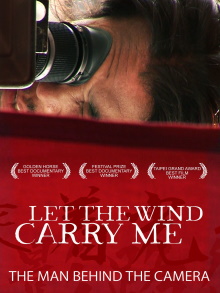Here is another documentary about the Taiwanese filmmaking scene with the focus this time being on cinematographer Mark Lee Ping-bing. Cinematographers are of course never as well known as directors but this is the person who shot among other works In the Mood for Love with Wong War Kai, The Sun Also Rises with Jiang Wen and many of Hou Hsiao-Hsien’s best known works, which makes him a rather big deal. Unfortunately this is only a passable documentary as it is light on technical detail and a little too intent on showcasing Lee’s relationship with his mother.
This is a fairly standard biography that covers Mark Lee’s life, beginning with him applying for a job at the state-owned CMPC and having to learn on the job and beg for scraps of knowledge from his seniors. He is eventually fired, apparently for spending too much time being loaned out to another studio, and moves on to Hong Kong where he learns to shoot action films. He emerges as a respected cinematographer, becoming a frequent collaborator of Hou Hsiao-Hsien but also producing work for many other well known directors around the world. Somewhere along the way, he marries and has children but a recurrent theme in this documentary is that he is too busy with his career to spend much time with his family who lives in the US, and his mother in Taiwan. Lee isn’t able to articulate much about the technical aspects of his work but he does liken it to a craftsman who is able to create something with seeming effortlessness but is unable to fully explain what it is he does. Nonetheless there are some fascinating anecdotes as he struggles to turn Hou’s rather vague vision into concrete reality or goes behind his back to add more light into a scene.
The heavy-set Mark Lee with his beard and unruly hair surely cuts an imposing and distinctive figure but he doesn’t make for a very good interview subject and that is one reason why this documentary is of only middling interest. The film tries to portray him a in good light, showing him working on the set and getting along well with the crew but his own commentary is vague and bland. Thankfully the directors he has worked with has much more interesting things to say. Wong War Kai rather mysteriously states that Christopher Doyle is like a sailor while Mark Lee is like a soldier. Jiang Wen praises him for persuading the director to work with the natural environment and circumstances as they find them instead of insisting on what they originally planned for. His collaboration with Hou on Flight of the Red Balloon is rather astonishing as it shows him exercising a large degree of creative freedom to interpret Hou’s instructions. No doubt every director and cinematographer work together in different ways but Hou himself states here that he isn’t a director like Hitchcock who plans every shot to exacting detail. He is happy to adapt what he shoots according to what they find and so it up to Lee to interpret what Hou wants and devise his own solutions.
Amusingly there are even cases when Lee feels that Hou’s artistic vision is technically impossible. For Flowers of Shanghai, Hou kept pushing for less and less light, reasoning that it would be realistic for interiors at the time to be so dark. Lee feared that this would leave the film horribly underexposed and perhaps almost completely dark and so colluded with his assistants to add additional light without Hou knowing. I also liked how the documentary compiles similar scenes that Lee has made for various different projects. It also shows Lee being fascinated by the strangest things, such as a leaf fluttering furiously in the wind, which is a little weird and not really that interesting. On the whole, this film doesn’t offer much detail on Lee’s specific preferences and techniques, beyond the fact that he is always adaptable and willing to tolerate a fair amount of random chance in his shots.
Overall this is an okayish but not really strong documentary. It’s actively off-putting how hard it tries to depict Lee as a decent person. This just isn’t necessary as we are interested in him as a cinematographer. It even rings false how it shows his mother and there is an appearance by his son saying how he has reconciled himself to his father’s frequent absences, but his wife is completely absent. I also felt that the documentary is too dismissive about his more commercial film projects, mentioning only his artistic works. Cinematography is a technically challenging job and mastery of technology should be part of it. All of this constitutes of his career and is worth being covered.
